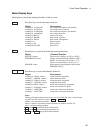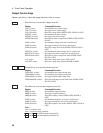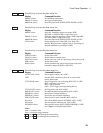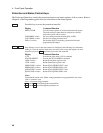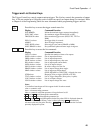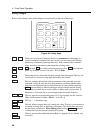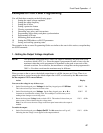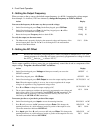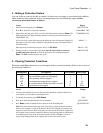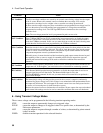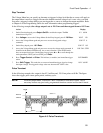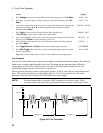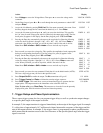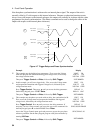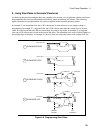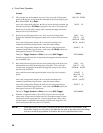
Front Panel Operation - 4
49
4 - Setting a Protection Feature
You can set the ac source to disable its output if it detects an overvoltage or overcurrent fault condition.
Other automatic fault conditions (such as overtemperature) also will disable the output. Set the
overcurrent protection feature as follows:
Action Display
1.
On the Function keypad, press Protect.
PROT:CLEAR
2. Press ° to obtain the overcurrent command. CURR:PROT OFF
3.
On the Entry keypad, press once to scroll to the ON parameter and press Enter. The
OCP annunciator will light, indicating that the overcurrent protection circuit is on.
CURR:PROT ON
If you wish to set a time delay between the detection of the fault and the disabling of
the output, scroll to the delay command on the protection menu. The default delay is
100 milliseconds.
Enter the delay from the Entry keypad, such as . 2 5 0 Enter.
CURR:PROT ON
DELAY .1
DELAY .250
4.
When you want to restore normal operation after the cause of the overcurrent
condition has been removed, scroll to the protection clear command and press
Enter. The OCP annunciator then will go off.
PROT:CLEAR
5 - Clearing Protection Conditions
When the output Prot annunciator is on, the output of the ac source has turned off due to one or more of
the following conditions:
Annunciator Description Bit Number Bit Weight
OV overvoltage protection has tripped 0 1
OCP rms overcurrent protection has tripped 1 2
SOA safe operating area has tripped 2 4
OT overtemperature protection has tripped 4 16
RI an external remote inhibit signal has occurred 9 512
Rail rail protection has tripped 11 2048
Action Display
1. You must first identify the cause of the protection shutdown, and then eliminate its
cause before you can continue operating the unit.
2.
To identify the problem, press Shift Status.
*CLS
3. Press ô to obtain the Questionable Event command. QUES:EVEN?
4.
Press Enter to find out which bits have been set in the Event Register.
Note: The value returned is the sum of all of the binary weights of the bits that have
been set. For example, a value of 20 indicates that bit 2 (bit weight=4) and bit 4 (bit
weight=16) have been set. Refer to the previous table for the bits and bit weights that
are assigned to the protection conditions. Refer to the following table for information
on eliminating the couse of the protection condition. Refer to
Chapter 4 in the ac
source Programming Guide for a complete discussion of the status system.
QUES:EVEN 20



